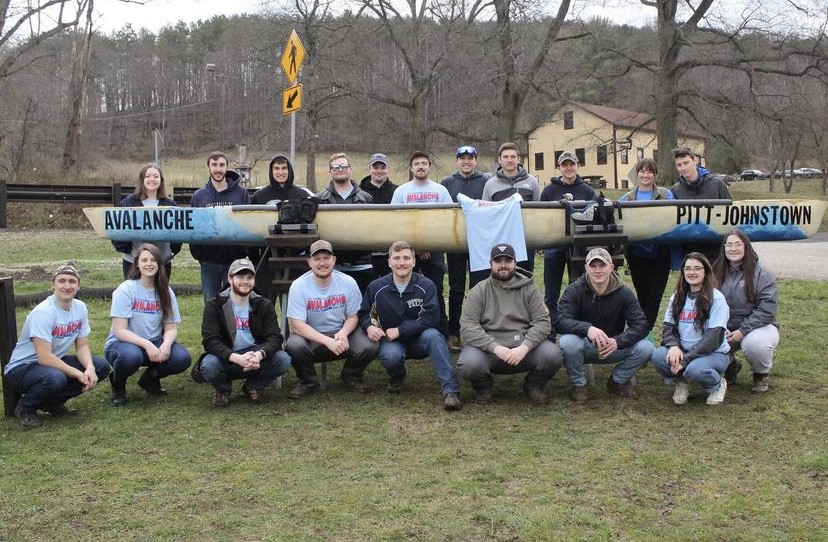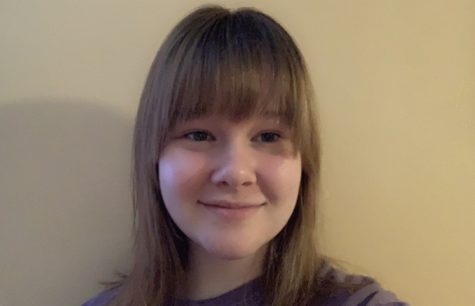UPJ Concrete Canoe Team Secures a Spot at Nationals
May 23, 2022
For nearly 20 years, Pitt-Johnstown has participated in the American Society of Civil Engineers’ (ASCE) Concrete Canoe Competition, and in April, UPJ placed first at the Regional 2 West competition, securing their spot at nationals.
Last year and the previous year, UPJ Concrete Canoe did not attend nationals due to the pandemic. However, in 2019, the team won ninth place overall in the society-wide conference.
This year at the regional competition, which was held at the University of Pittsburgh, the UPJ team competed against the Pitt-Oakland campus and Penn State. The first placing overall team from each region gets to then compete at nationals.
Regionals occur between the last week of March and the last week of April throughout the nation. Qualifiers go on to compete at the national level in June.
This year, nationals are in Ruston, Louisiana, and the competition will be held at Louisiana Tech University.
“Whether you come in first place or dead last, it makes no difference in terms of moving forward, because it’s the national level. It’s the highest level you can compete at,” UPJ Concrete Canoe Captain Jillian McGuckin said.
The morning started with a full technical presentation where students presented their canoe production process, followed by the full canoe display. Following display and judging, the UPJ team competed in 5 races: men’s slalom, men’s sprint, women’s slalom, women’s sprint and coed race.
During the conference, there are also events other than Concrete Canoe, such as ASCE Student Steel Bridge and Sustainable Solutions competition, occurring over the course of the two days as well.
McGuckin said that on competition day, all Concrete Canoe events were held from 8 a.m. to 10 p.m.
Part of the competition requires a theme for the canoe, and this year the theme was skiing, so the UPJ team named their canoe Avalanche and designed their display as a ski slope greeting center.
The official competition rules are not released until September, but during the summer, the team does a lot of preliminary planning, outlining and brainstorming theme ideas for the upcoming year.
Once the rules that outline the parameters, design constraints and allowed materials are released, the group swings into action.
Typically, the team will begin the production process by having a mechanical engineering student use Autodesk Inventor to render a 3D model of the canoe.
That model is put through a machine to make wooden templates. The team then uses those templates to cut out a Styrofoam mold.
“This usually occurs during the entirety of the first semester,” McGuckin said. At the same time, a student has begun working on the concrete mix design.
“They’re looking at what materials we can and can’t use and how to optimize our concrete to make it as light as possible,” she said.
When the team returns to school for the spring semester, within the first three weeks they have their “pour day.” This is when they pour their concrete mixture onto their mold. McGuckin said this is a whole day process.
“This year was actually one of our longest pour days in history, and it took us about 13 hours,” she said.
“Our year typically starts around now in a very weird way,” McGuckin said about the end of the spring semester, “After our regional event, whether or not we qualify to go compete at the national level, you know, the clock starts ticking for next year already once we come back from regionals.”
McGuckin, who has now graduated with a degree in mechanical engineering, has served as team captain, or project manager, for the past two years.
According to McGuckin, even though there are leadership positions, everyone takes initiative to work on the project.
“As people start coming down to the lab,” she said, “they start working with specific groups of people, then they start finding their interests, and that helps encourage leadership, figure out who will be taking over their position in future years.”
She also credits the team’s advisor, Bryon Huston, for much of the team’s success. “[He] is such an amazing advisor for our team, you know, professor, and he truly is why our team does so well.”
She says that with his help, the club is very student-led and that there is a lot of responsibility that comes with that autonomy.
“I think this club truly helps prepare anybody for their career in industry, because it really forces you to think outside of the box,” McGuckin said, “It really forces you to work with a large team, manage a large team, and this is a full gear project. I don’t think people realize the scope of that, but that’s what it’s like in the real world, you’re dealing with these full, large-scale, large-scope projects.”


